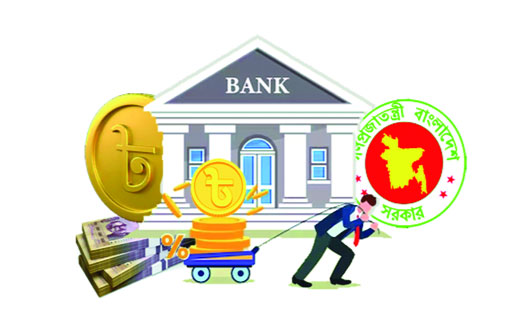Depositors shifting from govt securities to banks
For high interest rate
Savings paper sales lowered by Tk 1,287 cr in Jan
Bank deposits increased by Tk 13,259 cr in Dec
Mohiuddin Farazi : People are going to the bank leaving the savings card. As interest rates on bank deposits have recently increased more than interest rates on savings bonds, people are leaning towards it. As a result, sales of savings certificates are decreasing and deposits are increasing in banks. According to the data of Bangladesh Bank, the net sale of savings certificates decreased by Tk 1,287 crore in January this year. On the other hand, bank deposits increased by Tk 13,259 crore in December compared to November.
It is known that people are struggling to meet their daily expenses due to the abnormal prices of goods. Even if the income does not increase, they are still suffering due to the increased expenses. Bangladesh Bank has announced to reduce the flow of money in the market in the latest announced monetary policy to deal with the pressure of high inflation. For this purpose, the interest rate of loans and deposits has been increased.
According to the central bank, this will reduce the flow of money in the market and reduce the demand for goods, thereby making prices bearable. Whether or not this policy has an impact on the market, the flow of money has already begun to be affected.
Data shows that people are already under cost pressure. Due to these pressures saving sentiment has decreased. As a result, they are continuously reducing investment in savings bonds. On the other hand, extra interest is paid on deposits to keep money in the bank.
Therefore, a part of the customers are trying to meet the daily expenses by reducing the investment in savings certificates, another part is keeping money there due to the increase in the interest rate of the bank deposits. Due to this, the sale of savings certificates has decreased, and the amount of people’s deposits in the bank is increasing.
According to the data of the central bank, in January 2024, savings bonds worth Tk 7,964 crore were sold. And Tk 9,251 crores have to be paid for the interest-principal of the savings bonds sold earlier. As a result, the net sales of savings certificates decreased by Tk 1,287 crore in January.
According to bankers, people have moved away from savings to cope with high inflation. Another data of Bangladesh Bank says that last November, the deposit amount of the bank sector was Tk 16 lakh 40 thousand crores. It increased to Tk 16 lakh 54 thousand crores in December.
Analysts say that ever since Bangladesh Bank announced the Smart (Six Months Moving Average Rate of Treasury Bill) rate, interest rates on bank loans and deposits have been increasing. As a result, money is entering the bank from other sectors. Therefore, despite the increase in bank deposits, investment in savings bonds is decreasing.
According to the data of the National Savings Directorate, savings bonds were sold for Tk 49,257 crore in the first seven months of the current financial year (July-January). At the same time, the government has to pay Tk 56,506 crores as interest-principal in this sector. In other words, the government has not received any loan from this sector in seven months. On the contrary, additional payment of Tk 7,350 crores had to be made.
Spokesperson and Executive Director of Bangladesh Bank Majbaul Haque said, “The maximum limit of bank interest rate has been lifted from July of the current fiscal year. Interest rates have been market-oriented, which has created increased interest in bank depositors. This has increased bank deposits. And many have lost interest in buying savings bonds as interest rates have fallen and terms have increased.
Rare Israeli airstrike in Beirut kills Hezbollah commander and more than a dozen others
International Desk: Israel launched a rare airstrike that killed a senior Hezbollah milita…








